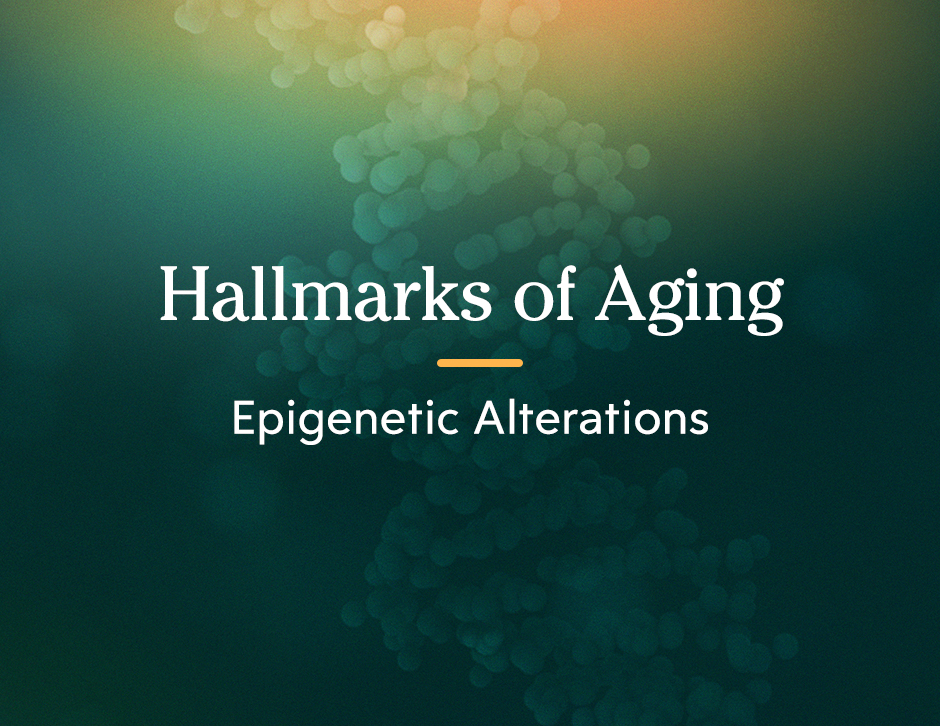
Quick overview of what you’ll learn from this blog post:
- What are epigenetic alterations?
- What causes epigenetic alterations?
- What are the consequences of epigenetic alterations?
Epigenetic alterations are described in the Hallmarks of Aging as age-related changes in gene expression that harm cellular function and increase the risk of cancer and other age-related diseases.
Changes to gene expression drives the aging process
Every single cell in our bodies have the same DNA but they often look and function very differently. So why is that?
The reason is that various alterations in our cells happen that change the expression of our genes, without changing their contents. Gene expression varies between cell types which causes them to produce different proteins and allows them to perform different functions.
So once a cell has settled into its role and become the correct cell type, its gene expression profile becomes fixed. This means that its daughter cells also have the same gene expression and remain the same cell type as its parent. This is what lets liver cells stay as liver cells, kidney cells stay kidney cells, brain cells to remain brain cells, and so on.
Unfortunately, as we age these established gene expression patterns begin to change. A gene can be turned on or off and that change will then be passed down to the next generation of cells too. These changes gradually mean that daughter cells begin to stop resembling their parent cell as closely.
They can develop new epigenetic alterations and lose old ones. This means that these cells can start producing proteins that are unsuited for the type of cell or loose proteins needed for the cell to function properly.
How do epigenetic alterations happen?
Epigenetic alterations can occur in various ways, the most common ways are:
- Changes to methylation state
This is a biological process where methyl groups are added to or removed from the DNA molecule. Generally speaking, methylation turns genes “off” and demethylation turns genes “on” and can change how proteins behave. These changes to methylation state can open the door for age-related diseases like cancer to develop. In the case of demethylation, it can cause a loss of chromosomal stability which again paves the way for cancer. - Histone modification
Histones are spherical shaped proteins that our DNA wraps around to form the chromosomes. For gene expression to happen, the wrapped DNA must unwind. Changes to the histones can prevent the DNA from unwinding and stop gene expression from happening. Turning off genes can lead to dire consequences if the particular gene is producing proteins critical to the cell’s function. - Non-coding RNA
Non-coding RNA serves as a messenger to facilitate protein production during a process called translation. However, some RNA sequences regulate gene expression. - Telomere shortening
Telomeres affects diverse processes like gene expression and how often a cell can divide. Over time, as telomeres shorten, their regulation of gene expression also changes. These changes can contribute to epigenetic alterations. This also highlights just how interconnected the aging hallmarks are and that one influences another as we age. - Increased transcriptional noise
A primary cause of variance in the gene expression happening between cells, this hallmark can lead to epigenetic alterations. Transcriptional noise can cause misinterpretation of genes, which can cause irregulated protein production and other dysfunctional behavior. Various lifestyle factors can negatively change epigenetic patterns. These include poor diet, obesity, lack of physical activity, smoking, alcohol consumption, environmental pollution, psychological stress, and working night shifts.
What can we do about epigenetic alterations?
Researchers are testing a number of approaches which might help to address epigenetic alterations. There is also some evidence suggesting that caloric restriction may slow down the rate of epigenetic alterations.
- Partial cellular reprogramming to reverse epigenetic alterations
- Fasting or caloric restriction to slow the rate of change
Epigenetic alterations appear to play a key role in the aging process. Therapies that can slow or even reverse the rate of these changes have huge potential to increase healthy human lifespans. Among these is our Infinite Longevity Support, which contains supplements that are expert-curated to slow hallmarks of aging like epigenetic alternations.
If you’re not sure where to start, try a longevity consultation. With one-on-one insight into how epigenetic alterations may be affecting your longevity, you can identify where to focus your efforts and what steps to take, bringing you one step closer to enjoying extra healthy years with your loved ones.
Note: The above statements have not been evaluated by the Food and Drug Administration. This product is not intended to diagnose, treat, cure, or prevent any disease.
